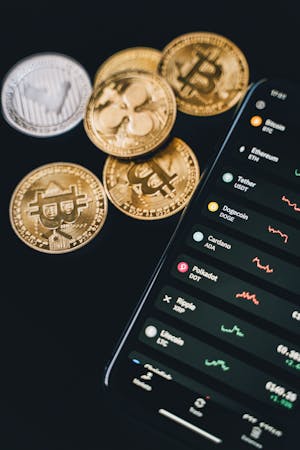As we venture deeper into the digital age, one financial phenomenon is reshaping how individuals and businesses in high-revenue generating countries perceive and interact with money: Decentralized Finance, or DeFi. While the concept of decentralized financial systems isn't completely new, its application in emerging markets is gaining incredible momentum, and the implications are profound.
Understanding DeFi
Before diving into its impact, let’s clarify what DeFi is. Essentially, it refers to a financial system built on blockchain technology that eliminates intermediaries like banks and brokers. Users can lend, borrow, trade, and earn interest directly through decentralized applications (dApps), all while maintaining ownership and control over their assets. This innovation promises a more equitable, transparent, and efficient way to conduct financial transactions globally.
A Shift in Dynamics
In high-revenue generating countries like the United States, Germany, and Japan, DeFi has already begun catching the attention of tech-savvy investors and traditional institutions alike. The primary focus has been on cryptocurrencies and blockchain technology, driving innovation and investment. However, the true potential of DeFi lies not just in wealth generation but in disrupting traditional banking systems, particularly in emerging markets.
Emerging economies often suffer from fragmented financial systems, high transaction costs, and limited access to credit. In contrast, DeFi platforms offer an alternative that can reduce barriers to entry, enabling millions of individuals who are currently unbanked or underbanked to access essential financial services.
Harnessing DeFi for Financial Inclusion
Imagine a small business owner in a developing country who struggles to secure a loan from conventional banks due to a lack of collateral or a poor credit history. Through DeFi, she could potentially access microloans from global lenders directly via smart contracts, significantly reducing both the cost and time associated with borrowing.
This is more than a theoretical concept. Countries like Nigeria and India are already seeing a surge in DeFi adoption. A recent report indicated that Nigeria's crypto adoption rate is among the highest in the world, driven by the need for a stable currency alternative against local inflation and volatility. This trend resonates with many tech-savvy young investors who are eager to participate in the global economy.
Investment Opportunities in DeFi
For investors in high-revenue generating countries, the DeFi wave presents a dual opportunity: to support and engage with projects that promote financial inclusion while also exploring potentially lucrative investment returns. By investing in innovative DeFi platforms that cater specifically to the needs of emerging markets, savvy investors can not only diversify their portfolios but also contribute to creating a more inclusive global financial system.
Moreover, with regulatory frameworks slowly evolving to accommodate the rise of decentralized finance, traditional financial institutions may begin collaborating with DeFi projects to enhance their service offerings. This evolution highlights the significant potential for strategic partnerships that can bridge the gap between traditional finance and the innovations stemming from the blockchain ecosystem.
Challenges Ahead
However, while the prospects appear bright, there are challenges that require attention. Regulatory uncertainties, security vulnerabilities, and the need for user education are obstacles that must be overcome to fully realize the benefits of DeFi in emerging markets. Investors and developers must prioritize creating robust, transparent systems that ensure user safety while advocating for reasonable regulations that protect consumers without stifling innovation.
Conclusion
The rise of decentralized finance in emerging markets represents a new frontier in the global financial landscape. It opens up possibilities for innovation, investment, and, most importantly, inclusivity. As we look to the future, the integration of DeFi could be pivotal in creating a more accessible and equitable financial system for all.
For investors in high-revenue generating countries, this is not just an opportunity for financial gain; it’s a chance to be part of a transformative movement that could change lives across the globe.
Are you ready to explore the world of decentralized finance? Let’s dive in and start reshaping the future of finance together.


